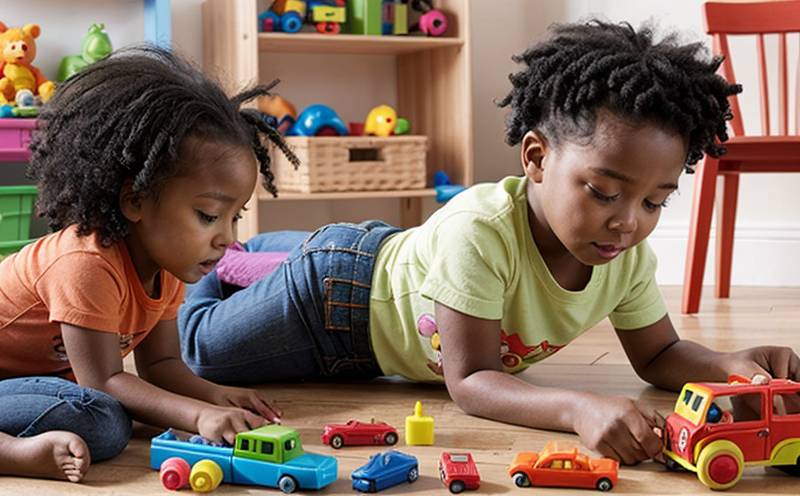Safety Testing of Baby Walkers (EN 1273)
The safety testing of baby walkers is a critical component in ensuring the well-being and protection of young children. As an essential part of infant mobility aids, these devices are designed to support babies as they learn to walk while keeping them safe from falls and other injuries. The European Standard EN 1273 sets out specific requirements for the safety testing of baby walkers, which include structural integrity, stability, and resistance to tipping.
The standard aims to prevent hazards such as falls, entrapment, and head injury by mandating stringent performance criteria that manufacturers must meet before their products can be placed on the market. Compliance with these standards is not only a legal requirement but also a demonstration of commitment to child safety and responsible manufacturing practices.
Our laboratory offers comprehensive testing services for baby walkers in strict accordance with EN 1273, ensuring that each product undergoes rigorous evaluation to meet all specified requirements. This includes static stability tests, dynamic stability tests, impact resistance tests, and more. Our team of experts uses state-of-the-art equipment and adheres strictly to the guidelines outlined by the standard.
By partnering with us, you can ensure that your baby walker meets or exceeds international safety standards, thereby safeguarding children against potential risks. We provide detailed reports outlining every aspect of our testing process, ensuring transparency and trust in your product’s safety performance.
The importance of thorough safety testing cannot be overstated, especially when dealing with items used by infants who are still developing motor skills. Compliance with EN 1273 is not just a regulatory requirement; it represents a commitment to the health and safety of young children.
- Static Stability Test: Ensures that the walker remains stable under static conditions, preventing tipping over.
- Dynamic Stability Test: Simulates real-world scenarios where walkers may be jostled or moved abruptly, ensuring they remain secure.
- Impact Resistance Test: Evaluates how well the walker withstands impacts from falls, reducing the risk of injury to the child.
- Entrapment Hazard Test: Checks for any potential spaces within the walker that could trap a baby’s head or limbs, posing a serious safety hazard.
Our laboratory is equipped with advanced facilities and experienced professionals who can provide you with peace of mind regarding your product's compliance. We offer detailed reports that outline every aspect of our testing process, ensuring transparency and trust in the performance of your product.
Applied Standards
The primary standard used for safety testing baby walkers is EN 1273:2014. This European Standard provides comprehensive guidelines on the design, construction, and use of baby walkers. It covers various aspects such as structural requirements, stability tests, impact resistance, and entrapment hazard checks.
The latest edition (2014) introduces updated specifications aimed at enhancing safety for children using these products. Compliance with this standard is mandatory in many countries across Europe and beyond, reflecting the global commitment to infant safety.
Why Choose This Test
Choosing EN 1273 compliance testing ensures that your baby walker meets rigorous international standards designed specifically for infant mobility aids. Here are several key reasons why selecting our service is beneficial:
- Regulatory Compliance: Ensures adherence to all relevant regulations, avoiding potential legal issues and fines.
- Enhanced Reputation: Establishes your brand as a leader in infant safety, enhancing consumer trust and loyalty.
- Risk Mitigation: Identifies and rectifies any design flaws or manufacturing defects early on, minimizing risks to children.
- Market Access: Facilitates easier entry into international markets where compliance with these standards is a prerequisite for sale.
In addition to meeting regulatory requirements, choosing our service also provides invaluable insights into how your product performs against industry benchmarks. This information can be crucial for continuous improvement and innovation within your product line.
Our team of experts works closely with you throughout the testing process, offering guidance on potential improvements and recommendations based on our findings. By leveraging these insights, you can enhance both the functionality and safety features of your baby walker, ultimately delivering superior products to consumers worldwide.
Competitive Advantage and Market Impact
Compliance with EN 1273 offers significant competitive advantages in the market. Here are some key points highlighting its impact:
- Increased Sales Potential: Products that meet these standards often command higher prices due to their reputation for safety.
- Better Customer Satisfaction: Meeting international standards reassures parents about the quality and safety of your products, leading to increased customer satisfaction.
- Differentiation from Competitors: By demonstrating strict adherence to these stringent guidelines, you set yourself apart from competitors who may not meet such high standards.
- Global Reach: Compliance opens up opportunities for expanding into new markets where these standards are mandatory or highly valued.
In today’s competitive landscape, ensuring the safety and quality of your baby walker is more important than ever. By choosing our service for EN 1273 compliance testing, you not only meet regulatory requirements but also position yourself as a leader in infant product safety.





